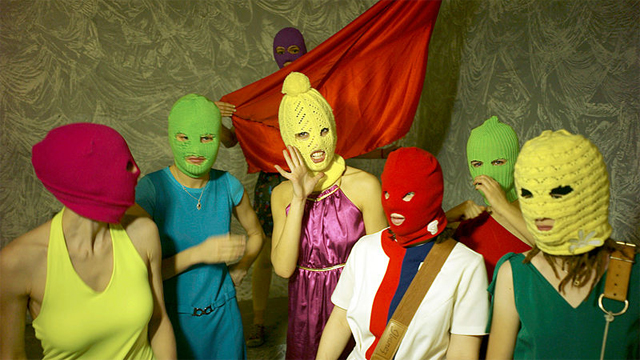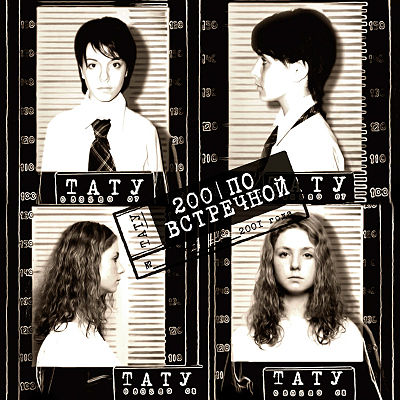
During the 2014 Winter Olympics in Sochi, the cultural spotlight was shared by two girl groups presenting two contrasting views of Modern Russia. The official view, of a world power and respectable culture, were represented by t.A.T.u. Reunited to perform at the Opening Ceremony, the pop duo are Russia's most commercially successful musical export, and signify Russia's desire for respect. This made President Vladimir Putin proud of his country, and he shone the spotlight on them brightly. Another view of Russia, that of a society dogged by outmoded conservatism and governed by a repressive totalitarian, is blazoned by Pussy Riot. The punk rock performance art group also recently reunited, and brought their tactics to Sochi, to film a protest for their new single. This view disappoints Putin, and he has gone to great lengths to hide this view from the spotlight.
You may remember t.A.T.u. as the controversial pop duo who brought alternative sexuality onto the international stage by making out and feeling each other up in the video for their 2002 hit "All the Things She Said." You may have even bought the album. Blender magazine declared t.A.T.u. "the future of rock & roll." Inevitably, their sapphic desires were revealed as a stunt, and the gimmick wore off. t.A.T.u.'s popularity in the West waned, although they remained popular in Russia and Eastern Europe for almost a decade until their breakup in March 2011.
Five months later, a group of feminists with anarchist connections founded a new collective. Today, Pussy Riot are likely the most famous Russian band, while operating as everything but: performance artists; political theatrics; intellectual figures; human rights activists. Forbes magazine declared Pussy Riot "the future of civil disobedience." But their status as a band remains, despite barely being one. Most fans had not heard their music until last week, apart from a handful of cellphone video documentations. You can't find them on Spotify, but you definitely know who they are.
As far as Vladimir Putin is concerned, Pussy Riot is attracting unwanted attention to his policies, while generating zero capital. Putin is engaged in a meticulous campaign to present himself as a conquesting strongman and a modern myth for Modern Russia. He controls the media, influences the courts, decides whether businesses succeed or fail. And he has enacted a bizarre and horrifying law banning gay "propaganda." After his second consecutive term, he strongly endorsed the election of fellow United Russia party member Dmitri Medvedev, generally regarded as Putin's patsy. After Medvedev's term was up, Putin was able to run for another term since it would be non-consecutive. When citizens protested the inauguration of his controversial yet technically legal third term, he had them arrested in Bolotnaya Square.
Putin's criminalization of homosexuality and harsh treatment of protesters were the targets of Pussy Riot's infamous "punk prayer," titled "Mother of God, Drive Putin Away" and performed February 21, 2012, at the Cathedral of Christ the Savior. Dressed in their signature colorful balaclavas, Pussy Riot assembled at the altar and rocked out. They were eventually subdued by security personnel, with much difficulty. The Orthodox community, a close supporter and important voting block of Putin's United Russia party, was predictably outraged. Blasphemous, neon-colored feminists screaming in the sacred sanctuary? Something had better be done about that. So on March 3, Pussy Riot members Nadezhda Tolokonnikova, Maria Alyokhina and Yekaterina Samutsevich were arrested and charged with "hooliganism".


